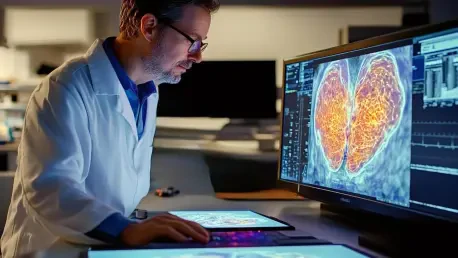The integration of Artificial Intelligence (AI) in healthcare is transforming how diseases, especially cancer, are detected and diagnosed. Recent advancements in AI-driven cancer detection promise improved accuracy and efficiency in identifying cancerous cells. The technology stems from the broader evolution of digital healthcare solutions, aiming to enhance patient outcomes through advanced computational models. With the ability to swiftly analyze large volumes of medical data, AI has become an indispensable tool in medical diagnosis, particularly in imaging and pathology.
Exploring the Technology Behind AI-Driven Cancer Detection
AI-driven cancer detection revolves around sophisticated algorithms and machine learning models, which form the backbone of its functionality. These models leverage vast datasets to identify patterns invisible to the human eye, providing precision previously unattainable. The performance of these algorithms sets AI apart in cancer detection, enabling early diagnosis and tailored treatment plans. Additionally, AI models continually learn and adapt, improving their diagnostic accuracy over time.
Data processing and image analysis are crucial components of AI-driven cancer detection. AI’s ability to process and interpret complex medical images, such as mammograms or MRIs, revolutionizes the field. By automating the analysis of these images, AI reduces the chances of human error, allowing healthcare professionals to focus on treatment strategies instead. Real-world applications of these capabilities are already being witnessed across various medical institutions, demonstrating their effectiveness in enhancing diagnostic workflows.
Recent Advances and Applications
Recent developments within AI cancer detection include innovative tools and platforms that incorporate cloud-based solutions. These advancements signify a major trend where sophisticated AI technologies are integrated into existing healthcare networks, enhancing diagnostic precision. For example, strategic collaborations between AI technology firms and cloud service providers have enabled seamless integration of AI applications into clinical workflows, thereby improving both access and efficiency.
At the heart of these applications are partnerships that extend AI’s reach to a broader network of healthcare providers. By embedding AI diagnostics into a widespread network of health facilities, medical professionals can access patient-specific insights more effectively. This technological shift signals a broader adoption of AI across the healthcare sector, where cloud-based services ensure that cutting-edge innovations remain accessible to all, regardless of geographic location.
Challenges and Prospective Solutions
Despite its advantages, AI-driven cancer detection faces challenges that hinder its widespread adoption. Technical hurdles such as data privacy concerns, regulatory compliance issues, and the need for substantial computational resources present significant obstacles. Furthermore, transitioning to a cloud-based infrastructure necessitates robust cybersecurity measures to protect sensitive patient data from potential breaches.
Efforts to overcome these challenges include ongoing research and development to ensure compliance with industry standards and enhance data security. Continuous collaboration between technology developers and healthcare providers aims to refine AI models, ensuring they meet the stringent requirements of medical diagnostics. By addressing these challenges, the industry can work toward realizing the full potential of AI-driven cancer detection.
Future Prospects and Potential Breakthroughs
The future of AI-driven cancer detection is promising, with potential breakthroughs on the horizon that could redefine the field. As technology continues to evolve, more advanced algorithms are expected to emerge, offering even greater diagnostic accuracy and efficiency. The integration of AI in personalized medicine also holds significant potential, enabling customized treatment plans based on individual patient data.
Innovations such as real-time data processing and enhanced image analysis tools are anticipated to become more prominent, further establishing AI’s role in healthcare. The long-term impact of these advancements is extensive, offering improved patient outcomes and a reduction in healthcare costs. Continued investment in AI research and development will inevitably reshape the landscape of cancer detection.
Final Assessment
In summary, AI-driven cancer detection represents a transformative advancement in the healthcare sector. Its integration into clinical workflows improves diagnostic accuracy and efficiency, offering significant benefits in early cancer detection. As technology advances, AI models constantly adapt, showcasing remarkable potential in personalized medicine and enhanced patient outcomes. Despite challenges such as regulatory compliance and data privacy, the ongoing evolution of AI in healthcare promises a future where early diagnosis and tailored treatments could become standard practice. Ultimately, the fusion of AI technology within the medical field marks an era of significant innovation and continuous improvement in cancer detection strategies.









